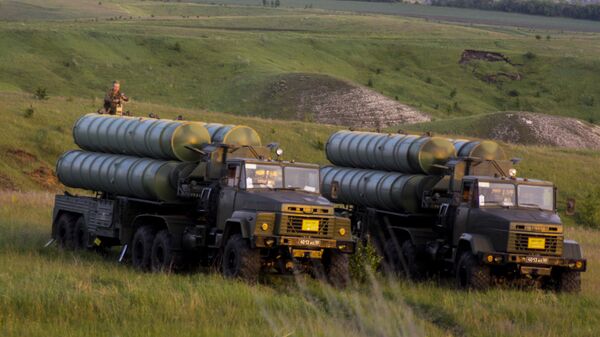Mark Heller, principal research associate at the Institute for National Security Studies, Tel Aviv University, has shared with Sputnik what Damascus’ potential purchase of the Russian long range surface-to-air missile S-300 systems would mean for Israel.
“Israel is concerned that more effective Syrian air defenses built around advanced Russian equipment would limit Israel's ability to operate against Iranian and Hezbollah forces in Syria, which are part of Iran's overall regional strategy, as well as against Syrian weapons of mass destruction facilities and supply lines to Hezbollah in Lebanon,” Heller said, echoing Tel Aviv’s official stance on Iran’s alleged presence in Syria.
While stressing that Israel favored the trilateral cooperation between the US, France and the UK, Heller has suggested that the alliance lacks a “broader strategic framework” to hinder “a total Syrian regime victory in the civil war” that, according to him, would boost Iran’s “hegemonic aspirations” in the region.
READ MORE: Israeli Media Alarmed Over Russia’s S-300 Supply to Syria
The researcher told Sputnik that despite Israel’s close partnership with the United States, Tel Aviv welcomed the thawing relations with Moscow, and hopes to see more progress in the future.
“Many Israelis see Russia as a potential stabilizing force in Syria and one that might contain Iranian expansion in the future. At the same time, it needs to be admitted that at the present time, Russia is aligned with the forces most hostile and potentially most dangerous to Israel – Iran and its various proxies. […] Conflict with Russia is the very last thing that Israel wants, but everyone needs to understand that Israel will act to forestall the most dangerous outcomes in Syria (i.e., Syria becoming a forward Iranian base),” Heller clarified.
Speaking about the prospects of the bilateral relations between Tehran and Tel Aviv, Heller said that “Iranian hostility toward Israel” will be perceived as “irreconcilable and exceedingly dangerous,” unless “the regime in Iran collapses.”
“Therefore, from Israel's perspective, the most important variable in Syria is how everyone else contributes to Iran's agenda or undermines it. Since Russia is now the foremost extra-regional power in the Syrian arena, its approach to this issue is critical in Israeli eyes and will be the major factor in determining whether tensions abate or escalate into outright conflict,” Heller concluded.
On April 14, Chief of the Main Operational Directorate of the Russian General Staff Col. Gen. Sergei Rudskoy announced that Moscow might reconsider selling the S-300 systems to Damascus in the wake of the US and allied airstrikes against Syria in response to the alleged use of chemical weapons by the Assad forces in the city of Douma.
According to the Russian Defense Ministry, a total of 71 cruise missiles out of 103, fired by the trilateral alliance, had been intercepted by Syrian air defense systems, which appeared to have been made in the Soviet Union over 30 years ago.
“Syria’s means of air defense: S-125, S-200 air defense systems, [as well as] Buk and Kvadrat units were used to repel the missile strike,” the ministry stated.
Mounting Tensions Between Israel and Syria
Last week, the Syrian state-agency SANA reported, citing its own correspondent, that the T-4, also known as Tiyas, airbase in Homs province had been exposed to a missile attack. While the media suggested that the United States might have been behind the attack – which the Pentagon immediately denied, the Russian Defense Ministry stated that two Israeli fighter jets had attacked the airfield, with strikes being carried out from Lebanese airspace. The ministry further specified that five out of eight rockets were repelled by Syrian air defenses before reaching their stated targets. As a result of the attack, 14 people were reportedly killed, including seven Iranian nationals.
READ MORE: Russian MoD: Two Israeli Warplanes Attacked Syrian Airbase
In February 2018, Tel Aviv launched an airstrike on the T-4 airbase, having hit 12 Syrian and “Iranian military targets.” On the eve of the attack, Israel claimed that one of its helicopters had intercepted an Iranian unmanned aerial vehicle after it had crossed into the disputed area of the Golan Heights, which have been at the center of a conflict between Syria and Israel, and struck at what the IDF described as Iranian targets in Syria, prompting retaliatory fire from Syrian air defense systems, which brought down the Israeli F-16 fighter jet.
The views expressed in this article are solely those of the speaker and do not necessarily reflect the official position of Sputnik.



